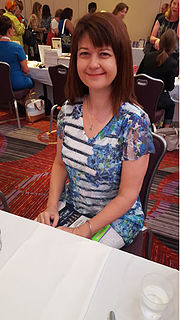A Quote by Jane Smiley
When 'The Awakening' was published it was considered so scandalous it was banned in the author's home-town library, and she herself was barred from the Fine Arts Club in the same city. What the novel has to offer, among other things, is honesty.
Related Quotes
When I read a novel that I really like, I feel as if I am in direct, personal communication with the author. I feel as if the author and I are on the same wavelength mentally, that we have a lot in common with each other, and that we could have an interesting conversation, or even a friendship, if the circumstances permitted it. When the novel comes to an end, I feel a certain letdown, a loss of contact. It is natural to want to recapture that feeling by reading other works by the same author, or by corresponding with him/her directly.
I always knew from that moment, from the time I found myself at home in that little segregated library in the South, all the way up until I walked up the steps of the New York City library, I always felt, in any town, if I can get to a library, I'll be okay. It really helped me as a child, and that never left me. So I have a special place for every library, in my heart of hearts.
I always knew from that moment, from the time I found myself at home in that little segregated library in the South, all the way up until I walked up the steps of the New York City library, I always felt, in any town, if I can get to a library, I'll be OK. It really helped me as a child, and that never left me.
Since it was announced that I had been awarded the Nobel Prize in Literature, the Chinese Foreign Ministry has condemned my works and criticized them harshly. All of my works are now banned from getting into China or being published in China. What author would want to return to a country that banned his or her books?
The average detective story is probably no worse than the average novel, but you never see the average novel. It doesn't get published. The average -- or only slightly above average -- detective story does.... Whereas the good novel is not at all the same kind of book as the bad novel. It is about entirely different things. But the good detective story and the bad detective story are about exactly the same things, and they are about them in very much the same way.
I've been in towns where there is no library, or where the library for the high school and the library for the town is one room, and it's smaller than my modest living room here. So you don't have many resources in 1950 or even 1970. This is the year, 2013, every town in America is connected to the web. Every town in America is therefore connected to all kinds of resources at the Library of Congress, at 100,000 websites.
When she is older she will see in these resemblances a regrettable uniformity among individuals (they all stop at the same spots to kiss, have the same tastes in clothing, flatter a woman with the same metaphor) and a tedious monotony among events (they are all just an endless repetition of the same one); but in her adolescence she welcomes these coincidences as miraculous and she is avid to decipher their meanings.
The universal nature has no external space; but the wondrous part of her art is that though she has circumscribed herself, everything which is within her which appears to decay and to grow old and to be useless she changes into herself, and again makes other new things from these very same, so that she requires neither substance from without nor wants a place into which she may cast that which decays. She is content then with her own space, and her own matter, and her own art.
And of course, Indonesian people are above all scared of being 'different'. Being different here is punished brutally. Different people get mocked, ostracized, raped, tortured, and murdered. They are banned. To be a Communist is banned. To be gay is banned. To be an atheist is banned. To be a Taoist is banned. Being one of a thousand things is banned.
She missed the built environment of New York City. It was only in an urban landscape, amid straight lines and architecture, that she could situate herself in human time and history. She missed people. She missed human intrigue, drama and power struggles. She needed her own species, not to talk to, necessarily, but just to be among, as a bystander in a crowd or an anonymous witness.
The writing of a novel is taking life as it already exists, not to report it but to make an object, toward the end that the finished work might contain this life inside it and offer it to the reader. The essence will not be, of course, the same thing as the raw material; it is not even of the same family of things. The novel is something that never was before and will not be again.






































